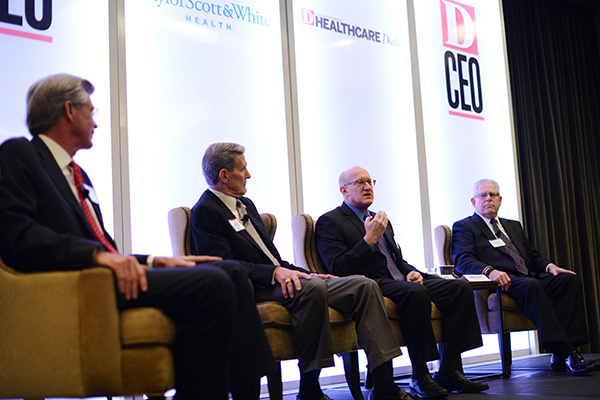
Talking with various North Texas health system executives in the weeks since Thomas Eric Duncan was diagnosed with Ebola, the conversation inevitably winds its way to this thought: This could’ve happened to any of us.
But it didn’t. It happened to Texas Health Presbyterian Dallas, where he was initially discharged with antibiotics after a misdiagnosis of a sinus infection. Three days later, Duncan returned via ambulance with vomiting and diarrhea. He was diagnosed with Ebola the next day and died in isolation on October 8.
Presby has taken heat from the press and politicians, and the CEO of Texas Health Resources, Barclay Berdan, admitted Wednesday that it’s accepted some of that blame. He praised the caregivers and detailed the system’s investigation into the case and the “learnings” that came from it. And then Joel Allison, CEO of Baylor Scott & White Health, the state’s largest nonprofit healthcare system, broadened the conversation with a stinging rebuke of the federal government’s handling of Ebola.
He lambasted the feds for failing to immediately appoint a single person or entity to help oversee and coordinate the local and national response to the virus. Texas—in particular, institutions in Dallas—received an unfair amount of ire because of the national government’s inability to act quickly, he argued.
“This is a failure on the national level, a big failure,” Allison said. “Ebola was known for years. If they would’ve addressed it when it needed to be addressed it could’ve been stopped frankly, in my opinion, in West Africa. The CDC was not handling this well; they’ve dropped the ball and it fell back on Presbyterian Dallas.”
Allison and Berdan took the stage at the Park Cities Hilton Wednesday morning alongside Methodist Health System CEO Dr. Stephen Mansfield and Dr. Bruce Meyer, the executive vice president of health system affairs at UT Southwestern Medical Center. In a breakfast discussion sponsored by D CEO magazine and D Healthcare Daily, the morning’s topics included access to care, clinical collaboration, incorporating technology into hospitals, and how to combat the impending physician shortage. It ended on Ebola.
“It’s one thing to be an Emory or a Nebraska or an NIH, where someone calls you up on the phone and says, ‘I’ve got an Ebola patient,’” Berdan said. “The best thing you can do—if you’re a local hospital, if you’re a rural hospital or an urban hospital—is to try and figure out how to manage the safety of your employees, the safety of your institution, the safety of patients who may present with, in this case, a disease that already causes people great fear.”
Four of the nurses who treated Duncan told 60 Minutes that he initially only reported traveling to “Africa,” not West Africa, where the virus has claimed nearly 5,000 lives, or Liberia, where he allegedly helped take a pregnant woman to a hospital who later died of the virus.
“The patients themselves, where they’ve observed shunning, where they’re not necessarily likely to be completely up front for fear of how they’ll be reacted to,” he said. “How do you change your system? And I don’t think anybody’s anticipating this is going to be a weekly or a monthly or potentially even an annual event, it’s a rare event. But how do you change your systems to manage that?”
THR has shared what it’s learned with other hospitals, both in North Texas and across the country. It held a webinar with 1,200 medical professionals to share what it learned and changed: It upgraded its medical record software to “clearly highlight” travel risks to places like Liberia, added a new triage procedures, and added a more detailed vital sign check-out prior to discharge. You can read more about those here.
On Wednesday Berdan spoke more philosophically about the changes. Technology, while it’s broadened and improved the type of care hospitals can provide, has in some cases degraded the in-person relationship between a physician and his or her patient as well as the conversations that occur between healthcare personnel. Nurses who help admit a patient should be speaking to their colleagues and superiors in other departments that are receiving the patient. Relying on information from the electronic health record isn’t enough, he argued.
“The current focus on technology and electronic health records … really depersonalizes healthcare,” Berdan said. “I think that’s been the case that we saw within our hospital and emergency room is that the electronic health record and the processes at work there cause people to not connect as much as people.”
Two nurses, Nina Pham and Amber Vinson, both contracted Ebola while treating Duncan. Both are free of the disease and have returned to their homes. Allison also turned his attention to the CDC guidelines hospitals were initially told to follow, which have shifted since Duncan’s diagnosis. Now, the required personal protective equipment (PPE) covers all skin—the nurses on 60 Minutes said their necks remained exposed while treating Duncan. It also significantly increased training procedures, specifically around removing the PPE.
“I will say this, your hospitals will be safer than they’ve ever been before because everybody has definitely ratcheted up,” Allison said. “The original guidelines that everybody was following that came out—we implemented them months before—were not the ones that finally got approved, they got changed.”
Then, he wound his way back here: “So, any of us could’ve been in that same situation.”




